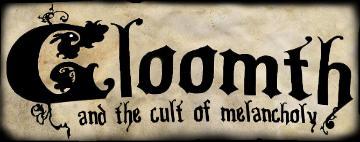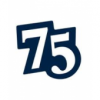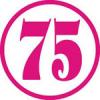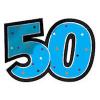
Many of the interviews in our Interview Series have been on unique, yet mainstream up-and-coming and established designers. So we took a turn off the road more-traveled and it led us to Taeden Hall and her clothing label Gloomth & The Cult of Melancholy.
Taeden's Gloomth label creates unique-looking style for the alternative community styles displayed prominently on her label's website with pictures taken by her professional photographer husband, Derek Cutting. Taeden's journey into the alternative fashion industry began after creating goth- and gothic-lolita-inspired designs to sell on Ebay between mind-numbing menial jobs. It was after her designs became too popular for her Ebay store that Taeden took her store off Ebay into its own online store and Gloomth began. Now, along with her team, Taeden runs the Gloomth label, its online store and blog.
Despite drawing influences from all corners of alternative style Taeden still remains true to her original vision as she runs Gloomth with (gothic) style and grace. We got a chance to catch up with Taeden to talk about her label and her overall entrepreneurial experience. The result was clever advice about how aspiring designers can follow in her rather-unconventional footprints:
For any of our readers not familiar with you could you explain your label's vision?
Gloomth & the Cult of Melancholy is a clothing label specializing in unique hand-made apparel for women and men. We are driven by a a desire for quality and a need to share our strange, dark vision with the world.
What inspired your brand's unique look?
Many things have inspired and contributed to Gloomth's signature style, from historical fashions to subculture street styles and fairytales.
Did you take any formal training before beginning your label? And how has your career path progressed over the years?
I have a BA in design, specializing in illustration (of all things). I have been sewing since I was about 12/13 though, so that has certainly helped. My career with Gloomth has progressed from being the sole employee to being the head of a small business with several employees. It's gone from something I did in a spare room at my home to a proper off-site production studio. My career and role with the label is constantly changing and evolving.
How did you initially get your foot into the door of the fashion industry? (aka what was your first job and how did you get it)?
My first true fashion industry job has been Gloomth. Prior I worked as an illustrator and did other odd jobs. I started Gloomth after relocating and it was difficult to find meaningful employment, at the time I couldn't face working another dead end "McJob". So I began making one of a kind pieces and selling them on ebay and the business built from there.
If you had the opportunity to start your career (or business) over again would you do anything differently?
Absolutely. I would have gone for a year+ of formal training in business and management, there have been a lot of things in that regard I wish I'd known ahead of time. I'd have applied for loans earlier.
If you had to describe the business side of the fashion industry briefly to our aspiring designer readers, how would you paint an accurate picture for them?
Business for us is primarily done directly with the customer, so that means lots of emails/calls and promotion. We also do some select wholesale with stores across the world. Business means the harsh reality that your creative vision might require compromise-- because after all, you have to eat so you have to find a way for your passion to be conveyed to and desired by other people.
Which designers and/or artists influenced you the most as a creative professional?
I would say Vivienne Westwood aesthetically, as well as a lot of street fashions, and perhaps Tom Ford for the breadth and strength of his career.
What is the most important skill and/or hard lesson you have learned while working in the industry?
This job has come with a great deal of "hard knocks" and lessons learned with great difficulty. The most important skill I've acquired is the ability to multitask efficiently and productively, as the head of this label I handle everything from customer relations to taxes and web design. I think the hardest lesson has been learning whom you can count on and whom you cant.
What was most surprising about working in the fashion industry?
Personally, the surprise for me has been that there are so many other people who crave the same sort of clothing as I do. It's been a really wonderful surprise!
If you were going to hire a new employee/intern what qualities would you look for in a person and portfolio and where would you look?
The qualities we seek most would be level of skills, efficiency, ability to manage time, and whether they can be trusted. As a smaller label our employees end up having a lot of "say" in aspects of the company so we want individuals we can grow with in that regard. In the past we have used Kijiji and Craigslist, which can be hit and miss.
Which role(s) in the fashion industry do you think will offer the best career opportunities moving forward? eg. designer, PR, entrepreneur, etc.?
I think there will be lots of jobs for the promotion end of things, I suppose there always are but lots of small businesses (and even large ones) don't have the first clue how to market themselves online to customers. Public relations is something many people are not good at so skilled individuals in that area are always in high demand.
Do you think today's jobs in the fashion industry require more of an artist's touch or business-like ruthlessness?
I think you have to wear both hats. The most successful people I have seen are both vividly creative and ferocious business people.
Which skills do you consider to be most critical for a career in fashion?
Creativity, dedication, "stick-to-itiveness", quick learning, and originality.
What would you recommend for aspiring fashion professionals looking to break into today's fashion industry?
Go to school, read everything on the topic you can find, do more research than you thought possible. Know your competition, know the market, know as much as you truly can before you begin. The clearer your vision when you set out the easier it will be to translate it into a viable career. Good luck!
Check out more interviews at The Fashion-Schools.org Interview Series.





